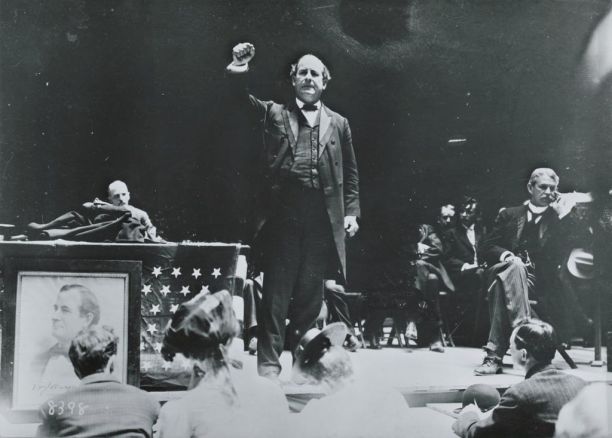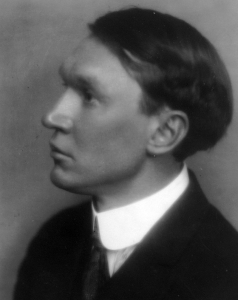- William Jennings Bryan campaigning for president, 1896
- William Jennings Bryan campaigning for president, 1896
In which we see that the teacher doesn’t always get to set the agenda
OK, kids, so now we’re going to turn to another poem. One of my favorites.
—I gotta say, Mr. K., you pick some weird ones. Not stuff we do in English class.
- Vachel Lindsay, 1913
—We have done Whitman.
I reckon you would.
—Whitman's got a syncopated style of repetitive poetry. Sounds like hip-hop.
Well, I suppose it was in its way, Ethan. One of the reasons I want to share the similar Lindsay with you is that this poem is written from the perspective of a sixteen year-old boy—in other words, someone about the same age as you. I thought you’d be interested in comparing perspectives. Here he is talking about “the Boy Orator of the Platte,” William Jennings Bryan.
—Who’s he?
—It was in the reading, dummy.
He brought in tides of wonder, of unprecedented splendor, Wild roses from the plains that made hearts tender All the funny circus silks Of politics unfurled Bartlett pears of romans that were hone at the cores And torchlights down the street, to the end of the world
—Sorry. I gotta ask: who was Bryan again?
He was the Populist as well as Democratic candidate for president in 1896. Now let me read you this pass—
—Wait: Populist and Democrat?
Yes. It was a little complicated because while Bryan headed both tickets there were different vice-presidents on each ticket.
—Really? Weird. What were their names?
Sorry to say I don’t remember. Actually, it doesn’t really matter. One was a Gold Bug and the other was s Silverite. As I was say—
—You know, I did the reading, but I really didn’t get the difference. The Gold Bugs liked gold. But why?
They wanted the dollar pegged to gold, which in fact it was. Every U.S. dollar in circulation had a specific smidgeon of gold sitting in a bank somewhere to match it. Silverites wanted to peg the dollar to silver, which was more plentiful. There were literally tons and tons of it, thanks the Comstock Lode in Nevada, a massive supply. Lindsay notes this—
—Why did they want that?
We did talk about this the other day, no?
—We did. But I’m still a little confused.
As I said then, pegging the dollar to silver will lower its value.
—Right. So if I’m in debt, like a lot of farmers were, having that dollar be less valuable makes it easier for me to pay back.
Exactly. On the other hand, if you’re a banker who lends money to a farmer, you want to be sure that money will be just as valuable after the farmer pays it back. But if you’re William Jennings Bryan and his supporters, the people you care most about are being crushed by the gold standard. When Bryan storms into Madison Square Garden to take the Democratic nomination for president—he was like a rock star in those days—he gave a famous speech in which he said, “You will not crucify me on a cross of gold.” It’s right here in the poem—
—Sorry. I just want to clarify one thing. What you’re talking about here is deflation, right?
Yes. That’s right. Good, Adam. Deflation. Dropping prices. Big problem for farmers. When prices go down, as they were doing in those days, farmers sold their crops for less money. That made it even harder to pay back their loans.
—But lower prices are good, aren’t they?
Depends who. We talked about this the other day. Workers in cities like cheaper food. This is one of the reasons why the Populists are having a hard time forging links with other segments of the American working class. A sad and familiar story. Divided we fall.
—Bryan lost that election.
Right. Some of my favorite lines in the poem are about that. “Defeat of my boyhood, defeat of my dream.” Here, let’s look at this stanza—
—Mr. K.?
Yes? I’d really like to get to the poem now, Chris.
—Sorry, but class is over.
Oh. Damn. Defeat of my lesson plan, defeat of my meme.

